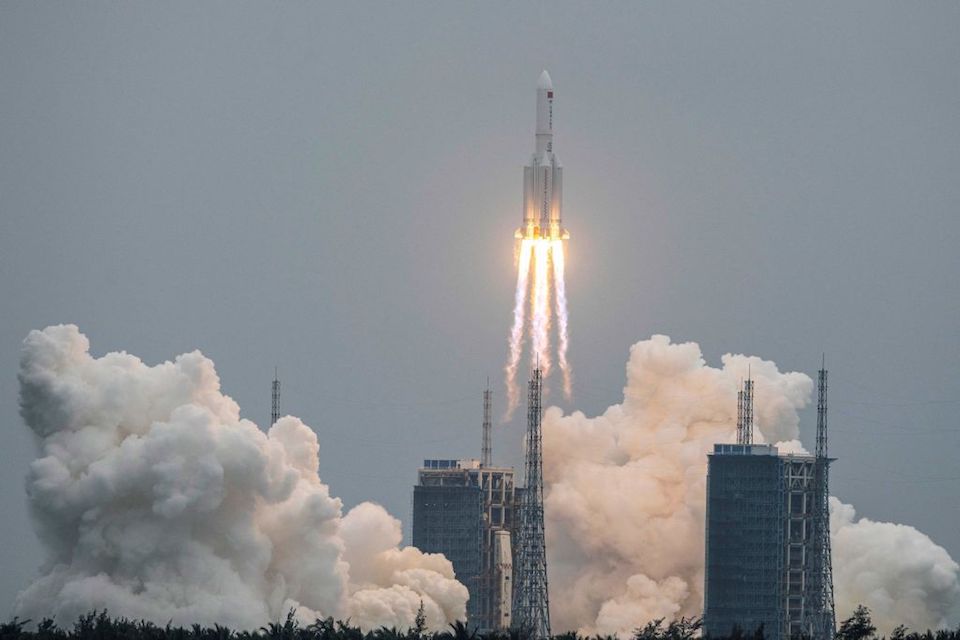For a week, China’s Long March 5B rocket attracted global attention, while space agencies and experts closely followed its trajectory, speculating where the remains of the device would fall after its uncontrolled re-entry into the Earth’s atmosphere.
In China, however, the country’s space administration was silent for days amid criticism that allowing such a large rocket platform to freely fall towards Earth was irresponsible and represented a security risk, albeit a small one, for many countries.
Finally, on Sunday morning Beijing time, China’s Manned Space Engineering Bureau broke its silence, confirming that the wreckage of the rocket had sunk in the Indian Ocean near the Maldives, after most of it had been sunk. burned in the atmosphere.
For many of those who have followed the rocket’s return, the news was a great relief. In China, it was not only seen as a vindication of the rocket’s design, but was also used by state media to argue that the intense global attention was simply a Western effort to discredit China’s space program and thwart its progress.
After the return of the rocket
“Their publicity and defamation were in vain,” the Global Times, a state-run newspaper, said in an editorial on Sunday, accusing US scientists and NASA of “acting against their conscience” and being “anti-intellectual.”
“These people are jealous of China’s rapid progress in space technology,” the newspaper says. “Some of (them) even try to use the fuss they made to obstruct and interfere with future intensive launches by China for the construction of their space station.”
While Beijing has long accused Western countries and the media of treating China to a different standard, Chinese officials also have a nationalist response to any criticism, calling it a malicious attempt to “smear China.”
This fierce defensive attitude is particularly evident when it comes to China’s space program, a major point of national pride for the Chinese public and a source of prestige for the ruling Communist Party.
China in the space race
China lagged behind in space exploration, launching its first satellite only in 1970, 13 years after the Soviet Union and 12 years after the United States. But in recent decades, it has quickly become a pointer in the space race – it was the first country to land on the opposite side of the Moon in 2019 and successfully recovered moon rocks last year.
The defensive attitude to criticism from the West, especially the United States, stems in part from what Beijing perceives as Washington’s hostility to block its progress beyond Earth’s atmosphere.
Since 1999, the United States has imposed export controls on satellite technology to China. And in 2011, Congress passed a law that placed restrictions on NASA’s engagement with China.
Consequently, Chinese astronauts are excluded from the International Space Station (ISS), the only space station in orbit and a collaboration between the US, Russia, Europe, Japan and Canada.
As a result, China is building its own space station, the Tiangong (which means heavenly palace in Chinese). Last month, it successfully launched its first module with the Long March B5, the rocket that attracted the world’s scrutiny.
However, by blaming the West for its “smear campaign,” Chinese state media and space experts failed to explain why the Long March B5 had caused anxiety among global scientists.
What’s up with these rockets
Rocket stages are often dropped before they reach orbit along trajectories that can be predicted before launch. And when they are designed to reach orbit, they generally come with devices that allow for more controlled reentries and are aimed at the ocean.
Or they stay in so-called “graveyard” orbits that keep them in space for decades or centuries.
The Chinese rocket, estimated to weigh more than 20 tons, is the largest space object to return uncontrolled to Earth in nearly three decades, and a major departure from the practice of other space agencies.
There are also worrying precedents for such incidents: the US Skylab space station disintegrated over the Indian Ocean and scattered its remains over Western Australia when it returned to Earth in 1979. More recently, a fragment of debris from the Eighth SpaceX Falcon 9 landed on a farm in Washington state, after the second stage broke on its re-entry.
But amid growing political distrust of the United States and a lack of technology exchanges, significant international scientific exchanges with Beijing are being sidestepped in favor of fanning the flames of nationalist anger.

